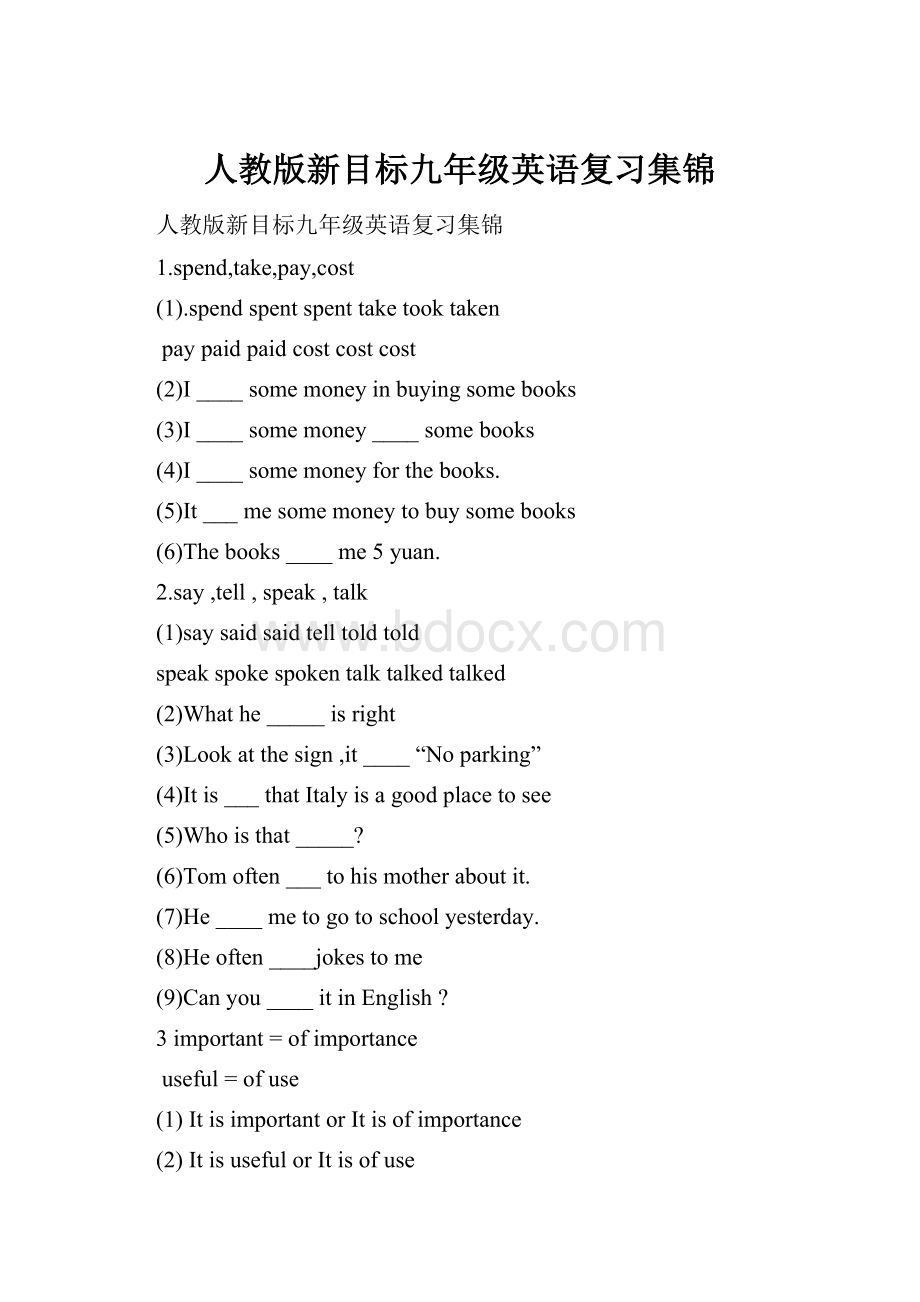人教版新目标九年级英语复习集锦.docx
《人教版新目标九年级英语复习集锦.docx》由会员分享,可在线阅读,更多相关《人教版新目标九年级英语复习集锦.docx(19页珍藏版)》请在冰豆网上搜索。

人教版新目标九年级英语复习集锦
人教版新目标九年级英语复习集锦
1.spend,take,pay,cost
(1).spendspentspenttaketooktaken
paypaidpaidcostcostcost
(2)I____somemoneyinbuyingsomebooks
(3)I____somemoney____somebooks
(4)I____somemoneyforthebooks.
(5)It___mesomemoneytobuysomebooks
(6)Thebooks____me5yuan.
2.say,tell,speak,talk
(1)saysaidsaidtelltoldtold
speakspokespokentalktalkedtalked
(2)Whathe_____isright
(3)Lookatthesign,it____“Noparking”
(4)Itis___thatItalyisagoodplacetosee
(5)Whoisthat_____?
(6)Tomoften___tohismotheraboutit.
(7)He____metogotoschoolyesterday.
(8)Heoften____jokestome
(9)Canyou____itinEnglish?
3important=ofimportance
useful=ofuse
(1)ItisimportantorItisofimportance
(2)ItisusefulorItisofuse
4.Itis+adj+for+sb+todosth
此句型中的形容词不可以表示人物的性格和品质,常见的有如下:
important,difficult,hard,
ItisimportantforyoutolearnEnglish
Itis+adj+of+sb+todosth
此句型中的形容词是表示人物的性格和品质,常见的有如下:
foolish,
clever,kind,nice,friendly,polite
Itisfoolishofyoutodothat.
5.英语中几个合写和分写的区别和应用
A,maybeadv是副词,可用于句子的开头和句中
maybe“可能是……”常用于句子的中间,是may情态动词加动词原形构成,可在句子中构成谓语.
1.Maybehewillbuythebook他可能会买这本书
2.Hewillmaybebuythebook他可能会买这本书
3.HemaybeTom他可能是Tom(此句中的maybe就不能用maybe替换)
B,everyone只指人不指物后面不能加of
everyone既指人又指物后面还能加of
(1)Everyonecanworkouttheproblem
(2)Everyoneofuscanworkouttheproblem
C,none既指人又指物后面还能加of
noone只指人不指物后面不能加of
(1)Noneofuscanworkouttheproblem
(2)Noonecanworkouttheproblem
D,
(1)Whoisintheclassroom?
Noone没有人
(2)Howmanyboysarethereinyourroom?
None(没有人)
(3)Whatisinyourbox?
Nothing(什么也没有?
)
E,everyday用做定语,放在名词的前面“日常的,每天的”
everyday用做状语,放在句首和句尾“每天”
WepracticeeverydayEnglisheveryday.
我们每天练习日常用语。
F,sometime过去或将来的某个时候
Sometimes有时
Sometime一段时间
Sometimes许多次
G,intime及时
ontime按时
H,each,every的区别
(1)each可以做主语,表示两者或两者之间的每一个
every不可以做主语,表示三者或三者之间的每一个
(2)Thereareflowersoneachsideoftheroad
Eachofushasabook
Everystudenthasabook
Thereisatreeeverythreemeters
6.find+it+adj+todo
Ifinditveryinterestingtoreadthestory
7.英语中有三看(lookat,watch,see)两听(listento,hear)一发现(find)一感觉(feel),他们都有以下的两个句式和宾语从句,下面以see为例:
seesb(宾格)doing看见某人正在做某事,强调动作的片刻,常常和atthattime,then,onmywayhome,when等连用
OnmywayhomeIsawhimplayingfootball.
seesb(宾格)dosth看见某人做过某事,强调某事已经发生完成和动作的全过程,或强调动作的反复发生,并且边被动语态的时候要在do前加上to
(1)Isawhimplayfootballinthestreet.(指这玩足球的这件事)
(2)Ioftensawhimplayfootballinthestreet.(强调经常看见他玩足球)
——Hewasoftenseentoplayfootballinthestreet.
当上句子的him是he的时候,就是宾语从句了,如下:
Ioftensawheplayedfootballinthestreet.
8.one…theother一个……另一个
some…others一些……另一些
(1)Ihavetwoapples,oneisredandtheotherisnot
(2)Ihavelotsoffriends.SomeareEnglishandothersareAmerican
Ihavelotsoffriends.SomeareEnglishandotherfriendsareAmerican
9.another+数词“另外几个”
数词+more/other“另外几个”
anotherfiveapples=fiveotherapplesorfivemoreapples
10.比较级中的other的用法
(1)Tomisthetallestinhisclass
Tomistallerthananyotherstudentsinhisclass
Tomistallerthanalltheothersinhisclass
Tomistallerthanalltheotherstudentsinhisclass
Tomistallerthananyoneelseinhisclass
(2)Tom比kate的班级里的任何一人都高(他两不在同一个班级里)
TomistallerthananystudentinKatesclass
TomistallerthananyoneinKatesclass
Tomistallerthanallthestudentsinhisclass
11.all都(三者或三者以上)
both都(两者)
none一个也没有(三者或三者以上)
neither一个也没有(两者)
either…or不是…就是…(表示两者之间选择)
neither…nor…两者都不
(1)Alltheboysgoshopping
(2)Boththeboysgoshopping
(3)Notalltheboysgoshopping
(4)Whichbookdoyoulike,aorb?
Neither.Ilikec
(5)Hedidnotgotoschool
NeitherdidI(我也没有去上学)
(6)Youcanparkyourcaroneithersideoftheroad.
12.either…or,neither…nor…,notonly…butalso…
therebe句型都遵循就近一致原则
NeitherhenorIgotoschoolbybike
NeitherInorhegoestoschoolbybike
13A,with,togetherwith,but,besides,except,aswellas等词连接两个并列主语时,谓语动词单复数取决于前者。
Heaswallaswegoestoschoolbybikeeveryday.
B,动词不定式和动名词做主语的时候,谓语动词用单数
C,时间,金钱,距离做主语时,谓语动词用单数
D,分数,百分数+of+名词,谓语的单复数取决于后面的名词
Twothirdsofthestudentsareboys
Twothirdsofbreadistasty
E,apairof+名词谓语的单复数取决于pair的单复数
Apairofjeansislong
F,当表示一个人的时候用单数
Theteacherandwriterismyfather
G,当each和every连接两个并列的主语时,谓语动词用单数
Everyboyandeverygirliscomimg.
H,当people,police做主语的时候谓语动词用单数
J,当the+adj表示一类人的时候,如therich,thepoor做主语,谓语动词用单数.
Thepoorarehungry
K,morethanone+可数名词的单数形式,谓语动词用单数
14.so,such,的用法与区别
(1)后接单数可数名词的时候,二者可以通用,但语序有所不同,so+adi+a/an+nsuch+a/sn+adj+n
Heissogoodaboy...Heissuchagoodboy...
(2)such后接复数可数名词和不可数名词,但是当复数可数名词和不可数名词前有many,much,few,little这四个词的时候,只能用so.
例如:
suchfineweathersuchwater
solittlewatersofewpeople
(3)so后接形容词和副词的原级。
Herunssofast
15.so...that...such...that...too...to...enough...to,inorderto,soasto.
16时间状语从句和条件状语从句,在语法上都遵循,主句如果是将来时,从句(when,assoonas,before,not...until.,if,unless,solongas所引导的)用现在时来表示将来时。
时间状语从句的常见的引导词:
when,assoonas,before,not...until.
条件状语从句常见的引导词语:
whether,if,unless,solongas(只要)
(1)IdonotknowifTomwillgoshopping做know的宾语
Ifhegoesshopping,Iwillgo,too.如果......表示条件。
(2)IdonotknowwhenTomwillgoshopping.做know的宾语
Whenhegoesshopping,Iwilltellyou.
“当......的时候”表示时间
(3)Iwillcallyouupassoonashecomesback.表示时间
17.if/whether的用法区别
(1)表示“是否”的时候可以替换
Idonotknowif/whethergoshoppingtomorrow.
(2)但是下面有几种情况只能用whether,
a.后面直接接动词不定式的时候Idonotknowwhethertogoshopping
b.后面接ornot的时候IdonotknowwhetherIcanpasstheexamornot
c.做主语的时候Whetherhedidthatisunknown.
(3)当表示如果的时候,就只能用if
18.when/while
A强调动作的同时发生
while后只能接延续性动词,常常是动词的进行时态
when后面可以是延续性的动词,也可以是暂断性动词
(1)IwaswatchingTVwhilemymotherwascooking
(2)TomwaswathingTVwhenIgottohishome.
B.when也可以表示两个动作的先后顺序
WhenIgottothebusstop,thebushadalreadyleft.
19.makesbdosth---sb+be+made+to+do
ImakeTomdohishomework
Tomismadetodohishomework(byme)
buysbsth---sth+be+bought+for+sb
IboughtTomabook
AbookwasboughtforTom(byme)
英语中常见的用于被动的结构的句式有
beallowedtodosth被允许去做某事
betoldtodosth被告诉去做某事
beseentodosth被看见作了某事
beaskedtodosth被要求去做某事
20.except,besides,
Except表示“除了…之外”表示排除
AlltheboysgotoschoolexceptTom.Heisillathome
Besides表示“除了……还有”常常和other等表示“另外”之意的词语连用。
DoyoulearnotherlessonsbesidesEnglish?
Ihavefiveotherbooksbesidesthisone.
21.hear1.听到,侧重于听的结果2.听说,常常接宾语从句
IhearthatTomisillathome
hearof听说,接名词
Ihearofhisillnessathome.
hearfrom表示收到某人的来信,但是后面不可以接信
22.use的有关的句式
usedtodo过去常常做某事
beusedtodo被用来做某事
beusedtodoing习惯于作某事
beusedfordoing被用来做某事
beusedas被用做为什么东西
(1)Heusedtosmokebutnowheisusedtodrinkingmilk.
(2)Heusedtoworkverylate,didnothe/usednothe?
(3)Thewoodisusedasachair
(4)Theknifeisusedtocutmeat
Theknifeisusedforcuttingmeat.
(5)Heisusedtothelifeinthevillege.
(6)Iusetheknifetoeatmeat
Theknifeisusedtoeatmeat
23.make的有关的句式
makeabdosth使某人做某事
sbbemadetodosth某人被要求去做某事
bemadefrom…某物由……组成(不能看出原材料)
bemadeof…某物由……组成(能看出原材料)
bemadeinto…材料制成……成品
bemadein在……地方制造
bemadeupof由……构成(常指成员以及组成部分)
makegooduseof充分的利用
(1)Heusedtosmokebutnowhedoesnotandheisusedtodrinkingmilk.
(2)Thedeskismadeofwood
Woodismadeintoadesk.
ThedeskismadeinJiansanjiang
(3)Thedrinkismadefromwheatandgrains.
(4)Ourteamismadeoffiveboys.
24.attheendof“在…的末端”attheendoftheroad
bytheendof“到…为止”常用于现在完成时态
intheend最后
endup“结束”常接doing的形式
25.dowith常常和what连用
dealwith常常和how连用
26.重点短语集合
(1).putup挂起,张贴,临时搭建
(2).giveup放弃常常接doinggivein屈服
(3).stayup熬夜
(4).getup起床
(5.)handup举起手来handin上交
(6).lookup查阅
(7).putoff推迟(中考)
(8).takeoff起飞,脱下
(9).turnon打开turnoff关闭
turndown减小turnup增大
(10).lookover检查lookthrough浏览
(11).goover复习
(12).turnover翻转
(13).stay/keepawayfrom远离befarawayfrom距…远
(14).borrow…from从…借强调(借入)
(15.)lend…to把…借给强调(借出)
(16).satop/keeep/preverntsbfromdoingsth阻止某人做某事
(17).lookout=becareful/takecare表示当心的意思
takecareof/carefor/lookafter照顾
careabout关心,在意
lookoutof从…往外看
(18).looklike看起来像(指的是在外貌上)
takeafter看起来像(指的是在外貌上或性格上的相像)
(19).问某人长的怎么样的两个句子Whatdoeshelooklike?
(外貌)
或Whatishelike?
(外貌或性格上)
(20).问天气怎么样的两个句子
Whatistheweatherlike?
Howistheweather?
(21).问“你怎么了?
”
Whatiswrongwithyou?
/Whatisthematterwithyou?
/Whatisthetroublewithyou?
/Whathappenedtoyou?
/Whatisup?
(22).lend…togive…toshow…to
buy.sbsth=buysthforsb
(23).asksbsthtellsbsth=tellsthtosbcannotwaittodosth
(24.)问职业的几种方法Whatishe?
/Whatishisjob?
/
Whatdoeshedo?
(25).Whatdoyouthinkofsth?
=Howdoyoulikesth?
(26).几个表示建议的几种问法Whydonotyouplayfootball?
/Whynotplayfootball?
/Whataboutplayingfootball?
/Howaboutplayingfootball?
(27)后接doing的几种形式
mind/practice/cannotstand/feellike/enjoy/lookforwardto
makeacontributionto对做….有贡献
havefun(in)doingsth在做…有乐趣
havefundoingsth乐于做某事/热忠与做某事
havefuntodosth乐于去做某事
在做…有困难有如下的几个句式
haveahardtime(in)doingsth在做…有困难
haveaproblem(in)doingsth
havedifficulty(in)doingsth
havetrouble(in)doingsth
以上的几个句式都可以用withsth的形式
某人忙于做某事
bebusy(in)doingsth
bebusywithsth
Heisbusyindoinghishomework.他正在忙于做作业
(28).need的用法
needtobedone=needdoing某物需要被做主语常常是物或事